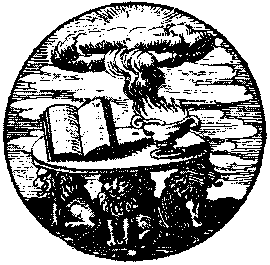|
The World of Teréth End - Spells & Magic |
||||||||||||||||||||||||||||||||||||||||||||||||||||||||||||||||||||||||||||||||||
|
"Learning the Answer, Clessid sat in thought. His life, devoted to this moment, was suddenly without focus. He searched within himself but could find no further purpose. Everything looked different now; the rocks at his feet, the low and distant clouds, the halved green moon rising other the valley. They would be waiting for him to return, but he knew now, that he would not." - Clessid's Journey, Tolywel |
Book of Dragum Orykul
Draga Orykul (OAR uh kuhl) is a valubale learning tool. Most magi learn at least one orykular spell (or cantrip) during their apprenticeship (Decipher). Without the (Decipher) spell, most further learning in the Arts is impossible. The nature of Draga Orykul is debated. The magic enables the caster to learn some unknown truth by means of spellcasting. The source of the knowledge gained is contested, and left unanswered by the magics themselves. Paradoxically, when otherwise dependable Orykular magics are employed to learn more about the nature of Draga Orykul, the results are unsatisfactory. This has led many sages to believe that all Oyrkular magics have one source (usually attributed to something near-divine), and that source refuses to reveal anything about itself. Despite not knowing how exactly the magic works, Draga Orykul is the most widely magic form employed in Teréth End. The five main categories of Orykular magic are:
Draga Orykul is forbidden in some areas. In Azàlari, where the magic is often used to select victims, case residences, or gain an upper-hand in business affairs, the magic is outlawed. The magics are however used by those same authorities for purposes of interrogation. Amythar is a popular stone in many areas, as it masks or warps divinatory magics. Amythar is not very uncommon though is very rare (and expensive) in its most pure forms. When cut and polished the stone is a deep translucent red, without the reflective properties of sapphire. Amythar is often worked into jewelry, clasps, and weapon pommels. In its purest form the stone offers good protection versus orycular magics. In its more common weak forms the stone offers some protection but its effects are often circumvented. In areas where amythar is widely used, Draga Orycul interrogations consist of redundant questions. D&D: Purity confers a +1 through +10 to Saves vs. Will. GURPS: Purity confers a +1 through +10 to IQ checks versus orykul magic. In both systems mathar offers a chance to resist all (Magery 2 and below) divinations. Grimoire Infinitum Spells included here are not those owned or maintained by the sirkùli or cults but rather spells that have fallen into "outside" hands. Some of these spells have been so widely circulated that ownership is no longer known or recognized. Sirkùli spells may be found on the individual sirkùla pages. Cult spells can be found on the individual religion pages. D&D Spells:
GURPS Spells:
|
Draga Orkid Dekàlan magics (Draga and Davra) are divided into 24 arts (see Draga Orkid). The magical Ways are: Ild'a
(to Control) The magical Forms are: Baras
(Animal) Additional 3E spells may be found in the: D20 Spell Indices Adept |
||||||||||||||||||||||||||||||||||||||||||||||||||||||||||||||||||||||||||||||||
Ref. TG (Touched by the Gods), © Atlas Games; DL (Dragon
Lords of Melníboné), © Chaosium; S&S (Spells & Spellcraft),
© Fantasy Flight Games; MC:A (Master Class; Assassin's Handbook), MC:S (Master
Class: Shaman's Handbook), © Green Ronin Publishing; KKP (Kingdoms of Kalamar:
Player's Guide), KVH (Kingdoms of Kalamar: Villain Design Handbook), © Kenzer & Co.; EM (The Book of Eldritch Magic), ©
Malhavoc Press; WS (Wild Spellcraft), © Natural D20 Press; D&D (The Divine
& The Defeated), R&R (Relics & Rituals), © Sword & Sorcery
Studios; PHB (Player's Handbook), DF (Defenders of the Faith), Drag (Dragon Magazine),
FR (Forgotten Realms Campaign Setting), MF (Magic of Faerun), MW (Masters of the
Wild), SS (Song & Silence), TB (Tome & Blood), © Wizards of the Coast
 |
||||||||||||||||||||||||||||||||||||||||||||||||||||||||||||||||||||||||||||||||||
 [way
(divine, augur) (perceive) (know) (obfuscate)]
[way
(divine, augur) (perceive) (know) (obfuscate)]